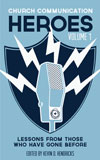A 2011 post about Martin Luther King Jr. sparked our recent Church Communication Heroes series, where we explore historical figures who inspire us today. In celebration of Martin Luther King Jr. Day it seemed only appropriate to explore King’s life in more detail as a church communication hero. This is the first in a three-part series.
I have become recently re-impressed with the character of Dr. Martin Luther King Jr. I had always looked up to MLK, in the high school history text book sort of way. Who wouldn’t? He was a Nobel Peace Prize winner, a leader of a movement and a minister. But it wasn’t until I started reading about him in a book by Malcolm Gladwell that he came back to my memory, and I started to think of him again.
I spent some time over investigating more about Dr. King. He is a man of great character. The more I learned, the more I was compelled to set a higher standard for myself.
I think there are a couple things we can learn from Dr. King about church communication.
1. “Our lives begin to end the day we become silent about things that matter.”
In the era of social media, church communications has become more prevalent than ever. There has never been a time where the church is saying more in public spheres than now. With an opportunity to say so much, it is difficult to know when to speak up, and when to be quiet.
With the increase in public communication in the church world, my challenge for you is to find the balance between relevance and silence. Speak truth, don’t be silent.
When Dr. King was first told about the incident with Rosa Parks, he had the choice to remain silent. In fact, he almost did remain silent, and I don’t blame him, especially when I see the high price paid by himself and his family. But in the end the entire world was changed by his commitment to not stay silent.
2. “Darkness cannot drive out darkness; only light can do that. Hate cannot drive out hate; only love can do that.”
The more post-Christian our country becomes, the more churches communicate their values and beliefs the more they are open to public scrutiny. Just ask Rob Bell or Mark Driscoll, two men who have suffered the brunt of this.
Never before do church communicators have a responsibility to meet hostility and hatred with love.
In one of the documentaries I watched Dr. King was interviewed immediately after he had been attacked by a white man who was angry about his beliefs regarding the equality of all men and women. When the reporter asked Dr. King if we would press charges, Dr. King responded without hesitation, “no.”
Dr. King has been a great example to me that, no matter what we are faced with, we have the ability to respond with grace and love.
3. “Non-cooperation with evil is as much a moral obligation as cooperation with good.”
As Christians participating in an online world, we will be known both for what we stand for, and what we stand against. But the way we stand “against” things matters. Dr. King offered a picture of a man who lived in his convictions, but didn’t pick fights.
In fact, he avoided fights.
But he was willing to go out of his way to make sure he wasn’t participating with what he knew wasn’t right—the unfair treatment of any citizens.
What is something else you know about Dr. King that church communicators can emulate?
 More:
More:
- Learn more about heroes in our ebook, Church Communication Heroes Volume 1: Lessons From Those Who Have Gone Before.
- Check out other heroes in our Church Communication Heroes series.
- Martin Luther King Jr. Day: Why and how your church should celebrate, including free social graphics to share.
- See more of our posts on Martin Luther King Jr.




